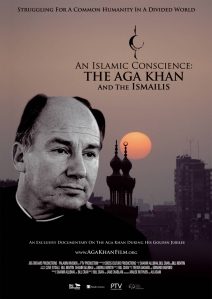Movie Review: AN ISLAMIC CONSCIENCE: the Aga Khan and the Ismailis - 2008-06-11
Movie Review: AN ISLAMIC CONSCIENCE: the Aga Khan and the Ismailis
Who is the Aga Khan? Who are the Ismailis? What is their history and how did they come to be? And what can the philanthropy sector learn from them?
With international conferences and various studies addressing issues and challenges faced by Muslim philanthropists and Muslim NGOs, as well as the broader topic of philanthropy in the Middle East, the space is starting to define and re-define itself. Indeed, the Council of Foundations conference in May hosted a “Bridging Divides” session, where prominent US foundations, including the Charles Stewart Mott Foundation, the Rockefeller Brothers Fund, and the Carnegie Foundation, among others, shared their experiences around inter-faith understanding, stability, and global security.
In the midst of this dynamic dialogue, AN ISLAMIC CONSCIENCE: the Aga Khan and the Ismailis documentary is a timely addition. The film showcases a model of philanthropy that acknowledges the notions of tradition and practice of giving in Islam while embracing a more strategic, collaborative and holistic view of human development and philanthropy.
AN ISLAMIC CONSCIENCE is a well-researched, produced and directed documentary on Islam and the Aga Khan. It serves as a catalyst of dialogue around hybrid philanthropy models, addressing inequities in our diverse world through systemic and holistic social change.
As a religious Muslim leader, the Aga Khan traces his lineage back to the Prophet Muhammad and currently leads a group of 15 million Ismaili Muslims globally. Like many philanthropists, his commitment to eliminating poverty and inequality is not unusual in our dichotomous world, but his integrated model towards human development is unique as it addresses the needs and desires of the whole person. His vision for human development takes into consideration an individual’s value aspirations for personal achievement through education and economic opportunities, which in turn have long-term and deep impact on the well being of their community and surroundings.
The film’s Washington screening on Capitol Hill recently was followed by a panel discussion with Shamir Allibhai, Filmmaker and Producer; Dr Paul Heck, Professor at Georgetown in Islamic Studies, and Dr Zahid Bukhari, Director of the America Muslim Studies Program at Georgetown. The discussion focused on harnessing the power of media and the corporate sector to create awareness and understanding of the divides between Muslims and non-Muslims that exist globally.
The Aga Khan film not only gives us a historical perspective of Ismailis, the Aga Khan and his philanthropy, but proves to be a “good story” for Islam and is a much needed addition to the repertoire of resources in the realm of Islam-based philanthropy. It will thus serve as an important medium for promoting interfaith dialogue. The uniqueness of the Aga Khan philanthropic model is that it embraces many faith-based aspects including its ideals, values and constituency - but it is not faith-limited.
The panel discussion concluded with Congresswoman Eddie Bernice Johnson talking about her journey of inter-faith dialogue and cultural understanding in her home state of Texas, and Congressman Keith Ellison, the first Muslim member of Congress, speaking to the changing landscape of politics, religion and race while touching upon the diversity in Islam in the US. Other screenings have been hosted at Harvard’s Kennedy School of Government as well as its Divinity School, Stanford University, London, Canada, and beginning next week, a series of screenings will be held in Tanzania, Uganda and Kenya.
To learn more about the film and its filmmakers, please visit www.agakhanfilm.org
- 10182 reads
 Ismaili.NET - Heritage F.I.E.L.D.
Ismaili.NET - Heritage F.I.E.L.D.